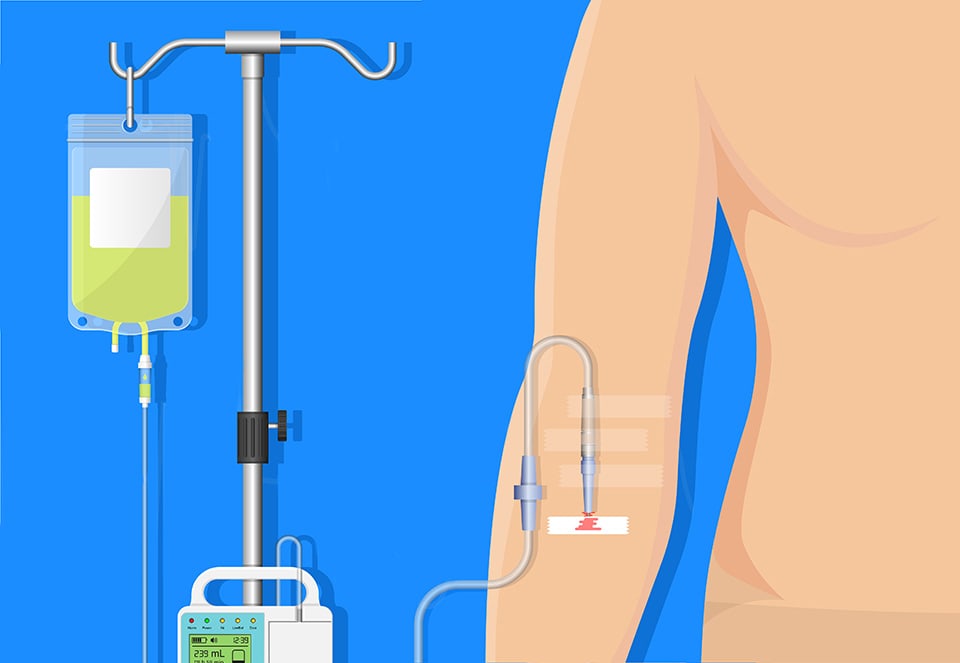You might consider taking medicine to reduce symptoms and treat your health if diagnosed with an autoimmune disease or persistent infection. However, you could be taken aback if your physician suggests that you undergo biologic infusion therapy as a form of treatment.
Well, it is in our nature that we surely want to get the best treatment possible if, at some time in our lives, we get diagnosed with a chronic disease. Biological infusion therapy involves treatment with biologics. Now, what are the biologics?
Biologics are the specialized medicines and drugs that are prepared from living cells. These biologics, when infused in your body, are effective and make you heal faster with chronic or autoimmune diseases.
The most frequent method of infusion therapy is intravenous (IV) injection, in which a drug or fluid is inserted straight into a vein or catheter. As an alternative, the medication may occasionally be injected into the muscle. The more common oral medicine administration is not used in infusion therapy.
The particular strategy employed is determined by the medicine type and the ailment being treated. These treatments, which can be given in an outpatient setting, have the potential to save lives, but many patients are not familiar with the infusion therapy preparation and administration process.
In this blog, you will get to know in detail about biologic infusions and biological infusion therapy. Moreover, you will also get to know which diseases can be treated with this new and advanced treatment way:
Biological Infusion Therapy
Biological infusion therapy, also known as biologic therapy or immunotherapy, is a specialized medical treatment that utilizes substances derived from living organisms to treat various medical conditions.
These therapies have revolutionized the field of medicine, particularly in the management of autoimmune diseases, cancers, and certain chronic conditions. The term “infusion therapy” refers to the administration of these biological agents through intravenous infusion.
Here are key aspects of biological infusion therapy:
Biological Agents:
Biological infusion therapy involves the use of biologics, which are substances derived from living cells or organisms. These can include monoclonal antibodies, cytokines, growth factors, and other proteins.
Monoclonal antibodies are a common type of biologic used in infusion therapy. They are designed to target specific molecules or cells involved in disease processes.
Autoimmune Diseases:
Biological infusion therapy has proven highly effective in the treatment of autoimmune diseases, where the immune system mistakenly attacks the body’s own tissues. Conditions such as rheumatoid arthritis, psoriasis, and inflammatory bowel diseases can be managed with these therapies.
Cancer Treatment:
Immunotherapy has emerged as a groundbreaking approach to cancer treatment. Certain biological agents, such as immune checkpoint inhibitors, work by enhancing the body’s immune response against cancer cells.
Infusion therapy for cancer may involve the use of monoclonal antibodies to target specific proteins in cancer cells, inhibiting their growth and promoting the immune system’s ability to recognize and destroy them.
Chronic Conditions:
Biological infusion therapy is also employed in the management of chronic conditions like certain types of asthma and multiple sclerosis. These therapies aim to modulate the immune response or target specific pathways involved in the disease process.
Administration Process:
Infusion therapy is typically administered in a clinical setting, such as an infusion center or a hospital, under the supervision of healthcare professionals.
The biological agents are delivered through an intravenous (IV) infusion, allowing for a controlled and gradual introduction into the patient’s bloodstream.
Monitoring and Side Effects:
Patients undergoing biological infusion therapy are closely monitored for any adverse reactions during and after the infusion.
Side effects can vary but may include mild reactions such as fatigue, fever, or nausea. Serious allergic reactions are rare but can occur.
Personalized Medicine:
Biological infusion therapy represents a form of personalized medicine, as these treatments are often tailored to target specific molecular or cellular components involved in a particular disease.
Ongoing Research and Advancements:
Ongoing research in the field of biological infusion therapy continues to identify new targets and develop innovative biologics for a broader range of conditions.
The development of biosimilars, which are similar but not identical versions of existing biologics, is also a growing area of interest to enhance accessibility and reduce costs.
In conclusion, biological infusion therapy has transformed the landscape of medical treatment, offering new hope and improved outcomes for patients with autoimmune diseases, cancer, and other chronic conditions.
The Most Common Conditions Treated with Infusion Therapy
The biological infusion therapy guide will not be completed if we do not discuss the diseases that can be treated with biological infusion therapy. Some of the common conditions and diseases that can be treated with biological infusion therapy include:
- Ulcerative Colitis or Crohn’s disease
- Plaque Psoriasis
- Rheumatoid arthritis
- Multiple sclerosis
- Lupus
- Myasthenia Gravis
- Cancer
Well, there are several other diseases that can be treated with biological infusion therapy.
What to Expect from a Biological Infusion Therapy Treatment
When undergoing biological infusion therapy, patients can expect a carefully managed and monitored process designed to deliver specific biological agents to treat various medical conditions. Here’s a more detailed breakdown of what patients can typically expect before, during, and after a biological infusion therapy treatment:
Before the Infusion:
- Consultation and Assessment:
Patients will undergo a comprehensive consultation with their healthcare provider, where medical history, current medications, and the specific condition being treated will be discussed.
Diagnostic tests and screenings may be conducted to assess the patient’s overall health and suitability for the treatment.
- Patient Education:
Healthcare professionals will provide detailed information about the biological infusion therapy, including the purpose of the treatment, potential benefits, risks, and expected outcomes.
Patients are encouraged to ask questions and seek clarification about any concerns they may have.
- Consent Process:
Informed consent will be obtained from the patient, ensuring that they understand the treatment plan, potential side effects, and alternatives.
- Preparation Instructions:
Patients may receive specific instructions to prepare for the infusion, such as fasting requirements or adjustments to regular medications.
During the Infusion:
- Infusion Center Setting:
The infusion is typically administered in a specialized infusion center, hospital, or clinic equipped with trained medical staff and monitoring facilities.
- Intravenous (IV) Access:
A nurse or healthcare professional will insert an intravenous (IV) line, usually in the arm, through which the biological agent will be infused into the bloodstream.
- Duration of Infusion:
The duration of the infusion varies depending on the specific biological agent and the patient’s individual treatment plan. Some infusions may take a few hours, while others may span most of the day.
- Continuous Monitoring:
Throughout the infusion, patients will be closely monitored for any adverse reactions or side effects. Vital signs such as blood pressure, heart rate, and temperature will be checked regularly.
- Comfort Measures:
Patients are encouraged to make themselves comfortable during the infusion, bringing items such as books, electronic devices, or snacks to pass the time.
After the Infusion:
- Observation Period:
After the infusion is complete, patients are typically observed for a period to ensure there are no immediate adverse reactions. The length of this observation period can vary.
- Post-Infusion Instructions:
Patients may receive specific post-infusion instructions, including any recommendations for activities, dietary considerations, or potential side effects to watch for.
- Follow-Up Appointments:
Follow-up appointments will be scheduled to monitor the patient’s response to the treatment. This may involve additional diagnostic tests or assessments to evaluate the efficacy of the therapy.
- Side Effects:
Patients should be aware of potential side effects, which can range from mild, such as headache or fatigue, to more severe reactions. It’s important to report any unexpected symptoms promptly to the healthcare team.
- Long-Term Treatment Plan:
Biological infusion therapy is often part of a more extensive treatment plan. Depending on the condition being treated, patients may require multiple infusions over time, and ongoing monitoring is common.
General Considerations:
- Communication with the Healthcare Team:
Open and transparent communication with healthcare providers is crucial. Patients should feel comfortable discussing any concerns, side effects, or changes in their health.
- Emotional Support:
The process of undergoing infusion therapy, especially for chronic conditions, can be emotionally challenging. Support from healthcare professionals, family, and friends is valuable.
- Adherence to Instructions:
Following pre- and post-treatment instructions is vital for the success of the infusion therapy. This may include adhering to dietary restrictions, taking prescribed medications, and attending follow-up appointments.
By understanding the various stages of biological infusion therapy and actively participating in their care, patients can approach the treatment with confidence and contribute to its success in managing their medical condition.
Contact Fuse Infusion for Biologic Infusion Therapy
A new and advanced method of treating various chronic conditions, such as autoimmune disorders, is biologic infusions. While receiving an infusion may initially seem a little frightening, there are steps you can do to make the process simple.
One of the top infusion centers working in the US is Fuse Infusion. For the treatment of various chronic diseases, we offer biologic infusion therapy. The patient will return to their regular life after this treatment.
Our team members are highly qualified and experienced, and they will support you throughout your therapy. To learn more, contact us at 914 460 4891 or get a free quote for biological infusion therapy!

